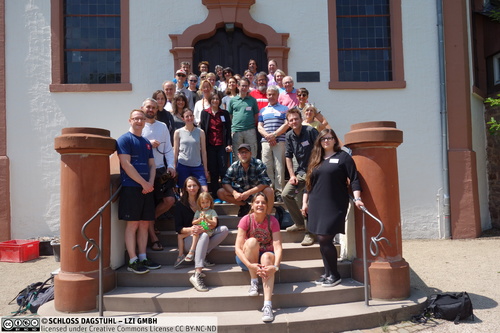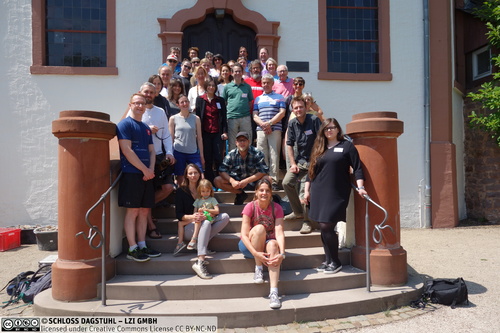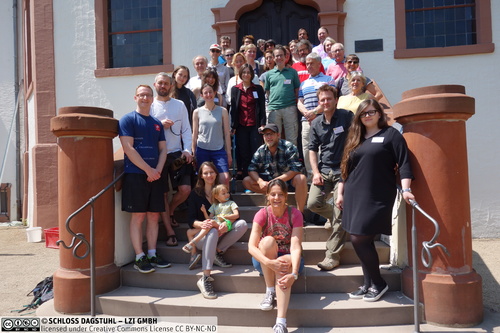Dagstuhl Seminar 19291
Values in Computing
( Jul 14 – Jul 19, 2019 )
Permalink
Organizers
- Christoph Becker (University of Toronto, CA)
- Gregor Engels (Universität Paderborn, DE)
- Andrew Feenberg (Simon Fraser University - Burnaby, CA)
- Maria Angela Ferrario (Lancaster University, GB)
- Geraldine Fitzpatrick (TU Wien, AT)
Contact
- Shida Kunz (for scientific matters)
- Annette Beyer (for administrative matters)
Dagstuhl Seminar Wiki
- Dagstuhl Seminar Wiki (Use personal credentials as created in DOOR to log in)
Shared Documents
- Dagstuhl Materials Page (Use personal credentials as created in DOOR to log in)
Schedule
"Values are the facts of the future" (Feenberg, A., 2010)
As we watch digital technology unleashing its power on personal, social, and organizational aspects of human life, we also witness its embroilment in software scandals and questionably ‘smart’ micro- targeting practices of people’s emotions and deeply held values at an unprecedented scale. The organizers of this seminar argue that the time is up for shifting the focus from understanding how digital technologies can change people’s lives and behavior to a better understanding how such technologies ‘behave’, whether by design or by use and ‘appropriation’.
This seminar stems from the need to look into approaches and methods to empirically and systematically study the values underpinning computing research, education, and industry. The overarching goal is to support the next generation of computing professionals with the deliberative and critical skills necessary to tell what values are worth pursuing in computing research, education, and industry from those that are potentially harmful to self and society.
Values are deeply held principles guiding decisions of individuals, groups, and organizations. Computing technologies are inevitably affected by values. However, some aspects often referred to as ‘values’, such as the financial value of a software product, are more easily quantified during decision making processes than others, such as the impact that a technology may have on equality in society. As a result, less measurable values are often dismissed during decision making processes as lacking evidence.
Yet, research shows that these values tend to be more strongly associated with responsible and sustainable practices than more commonly quantified ones. This is particularly problematic since it indicates that the systems we design are likely to be inadequate for tackling complex societal challenges such as environmental change, demographic shifts, and health-related issues that so often computing technologies are asked to address.
This seminar aims to unpack the complex relations between values, computing technologies and society. It does so by bringing together practitioners and researchers from several areas within and beyond computer science, including human computer interaction, software engineering, computer ethics, moral philosophy, philosophy of technology, investigative data science, and critical data studies.
We plan to examine concrete case studies through diverse disciplinary perspectives relevant to the study of values in computing research, development, and education. The Seminar aims to create two types of outcomes: a research agenda to be included in the Dagstuhl Report; and a jointly designed 'Values in Computing' teaching module, to be piloted across a selection of participating universities.
 Christoph Becker, Gregor Engels, Andrew Feenberg, Maria Angela Ferrario, and Geraldine Fitzpatrick
Christoph Becker, Gregor Engels, Andrew Feenberg, Maria Angela Ferrario, and Geraldine Fitzpatrick
The purpose of Dagstuhl Seminar 1929 ‘Values in Computing’ was to bring together practitioners and researchers with expertise stretching beyond computer science, to include sociology, ethics, and philosophy to examine the complex relations between human values, computing technologies and society. In so doing, the seminar invited an inter-disciplinary community to share their challenges, illustrate their approaches through concrete case studies, and distil lessons learned into actionable guidelines for research and education with tangible implications for policies and industry.
The seminar was motivated by the growing urgency for computing research and industry to answer questions about the role that digital technology plays in society. The greater the scale and reach of digital technology systems, the greater their impact, both intended and unintended. Mainstream media, popular science, and the general public have only started grappling with the scale of these consequences. Many are calling institutions, professionals, and scientists to act [3]. Recent years have seen an increasing number of high-profile software scandals and malpractices in which individual privacy and democracy have been undermined (Cambridge Analytica’s use of Facebook data), the environmental impact of air pollutants disregarded (the Volkswagen’s diesel emission scandal), and human lives lost (the Boeing 737 Max anti-stall software disasters).
These events are the constant reminders that human values are indeed “the facts of the future” [1], as Feenberg argues. Values are not the opposite of facts, they become facts: the more weight we give to certain values (e.g. wealth, political influence, power), the bigger the ‘blind spots’ of the existing values become (e.g. environmental sustainability, equality and social justice). There is a pressing need then to understand how human values operate and to build on this understanding to consider how research and education might contribute to a more socially responsible computing industry.
To this end, the seminar brought together disciplines with a long tradition of critical thinking and human-centred approaches to computing with those that, such as Software Engineering, have been traditionally considered, albeit increasingly controversially, as ‘values neutral’. The breadth and depth of the interdisciplinary debate, one of the key distinguishing features and strengths of this five-day seminar, was also, and intentionally so, one of its main challenges. This was particularly evident when the need to unpack the multifaceted and often abstract notion of human values was met by the demand for the discussion to be of concrete relevance to computing education and practice. Within this context, one of the key objectives of the seminar was to facilitate both the exploration of broad themes and the identification of specific topics that would require meaningful cross-disciplinary effort. To this end, a two-pronged approach was designed to encourage both divergence and converge of viewpoints.
Thematic divergence was encouraged through six short Seed Talks, ten open-floor Lightning Talks, and a Soap Box session were participants would pitch high-level challenges to provoke discussion. Convergence was facilitated by World Café style group discussions around six emergent themes. Over the last two days, these themes were then distilled into four topics with one working group assigned to each (Action, Education, Research, and Response). Seed Talks were invited 20-minute talks designed to be informative and provocative. Thematically, they were structured around the original seminar proposal scoping areas: theory and methodologies (Feenberg and Mainzer), professional practice (Spiekermann and Whittle); and educational pathways (Nathan and Patitsas). Participants offered Lightning Talks on a variety of topics of their own choosing. For instance, Easterbrook focused on the environmental crisis and called for urgent action; Walker, McCord and Lievrouw shared their experiences of socially responsible digital activism; Frauenberger provided concrete examples on how different ways of thinking informatics in education [2]; Winter outlined the tools and techniques used to study values in software production [4]; and Jensen-Ferreira shared her approach to software industry research. Finally, four teams worked on a specific Values in Computing topic, each identifying a possible course of action:
- Action – This group worked under the premise that the professional knowledge and critical insight of computer and social scientists should be mobilized as an active force in public education and policy-making concerning the design, implementation and regulation of information technology. With a view to these three lines of action, the group proposed the penning and wide distribution of a document, tentatively entitled “The Dagstuhl Declaration” here included.
- Research – The Research group pursued a threefold-goal: understand the state-of-the-art of the research and highlight under-explored research areas; discuss methods and tools that have been or can be used, and identify future research directions.
- Education – The Education group discussed the implications for undergraduate and graduate computing education by conducting a brief but focused exploration of existing university-level courses, methods and tools and their mapping of curriculum cross-cutting learning objectives.
- Response – This group worked on the intersection between climate emergency and the future of computing and centred its activity on gathering resources about this intersection and writing an opinion piece to address it.
References
- Andrew Feenberg. Ten paradoxes of technology. Techné: Research in Philosophy and Technology, 14(1):3–15, 2010.
- Christopher Frauenberger and Peter Purgathofer. 2019. Ways of thinking in informatics. Commun. ACM 62, 7 (June 2019), 58-64.
- Leon J. Osterweil. Be prepared. SIGSOFT Softw. Eng. Notes, 41(5):4–5, November 2016.
- Emily Winter, Stephen Forshaw, Lucy Hunt, and Maria Angela Ferrario. 2019. Towards a systematic study of values in SE: tools for industry and education. In Proceedings of the 41st International Conference on Software Engineering: ICSE-NIER ’19. IEEE Press, Piscataway, NJ, USA, 61-64.
 Maria Angela Ferrario, Christoph Becker, Gregor Engels, Andrew Feenberg, and Geraldine Fitzpatrick
Maria Angela Ferrario, Christoph Becker, Gregor Engels, Andrew Feenberg, and Geraldine Fitzpatrick
- Doris Allhutter (OEAW - Wien, AT) [dblp]
- Maria Bakardjieva (University of Calgary, CA) [dblp]
- Christoph Becker (University of Toronto, CA) [dblp]
- Stefanie Betz (HFU - Furtwangen, DE) [dblp]
- Marta Cecchinato (University of Northumbria - Newcastle upon Tyne, GB) [dblp]
- Teresa Cerratto-Pargman (Stockholm University, SE) [dblp]
- Clarisse Sieckenius de Souza (PUC - Rio de Janeiro, BR) [dblp]
- Steve Easterbrook (University of Toronto, CA) [dblp]
- Gregor Engels (Universität Paderborn, DE) [dblp]
- Andrew Feenberg (Simon Fraser University - Burnaby, CA) [dblp]
- Maria Angela Ferrario (Lancaster University, GB) [dblp]
- Geraldine Fitzpatrick (TU Wien, AT) [dblp]
- Christopher Frauenberger (TU Wien, AT) [dblp]
- David Hendry (University of Washington - Seattle, US) [dblp]
- Klementina Josifovska (Universität Paderborn, DE) [dblp]
- Selma Lamprecht (Fraunhofer FOKUS - Berlin, DE)
- Leah Lievrouw (University of California at Los Angeles, US)
- Ann Light (University of Sussex - Brighton, GB) [dblp]
- Klaus Mainzer (TU München, DE) [dblp]
- Curtis McCord (University of Toronto, CA) [dblp]
- Lisa P. Nathan (University of British Columbia - Vancouver, CA) [dblp]
- Daniel Pargman (KTH Royal Institute of Technology - Stockholm, SE) [dblp]
- Elizabeth Patitsas (McGill University - Montreal, CA) [dblp]
- Austen W. Rainer (Queen's University of Belfast, GB) [dblp]
- Peter Reichl (Universität Wien, AT) [dblp]
- Barbara Russo (Free University of Bozen-Bolzano, IT) [dblp]
- Irina Shklovski (IT University of Copenhagen, DK) [dblp]
- Juliana Soares Jansen Ferreira (IBM Brazil Research Laboratory - Rio de Janeiro, BR) [dblp]
- Sarah Spiekermann-Hoff (Wirtschaftsuniversität Wien, AT) [dblp]
- Dawn Walker (University of Toronto, CA) [dblp]
- Blay R. Whitby (University of Sussex - Brighton, GB) [dblp]
- Jon Whittle (Monash University - Clayton, AU) [dblp]
- Emily Winter (Lancaster University, GB) [dblp]
Classification
- society / human-computer interaction
- software engineering
Keywords
- computing in society
- responsible innovation
- sustainability informatics
- computer ethics
- philosophy of technology and moral philosophy.




 Creative Commons BY 3.0 DE
Creative Commons BY 3.0 DE
